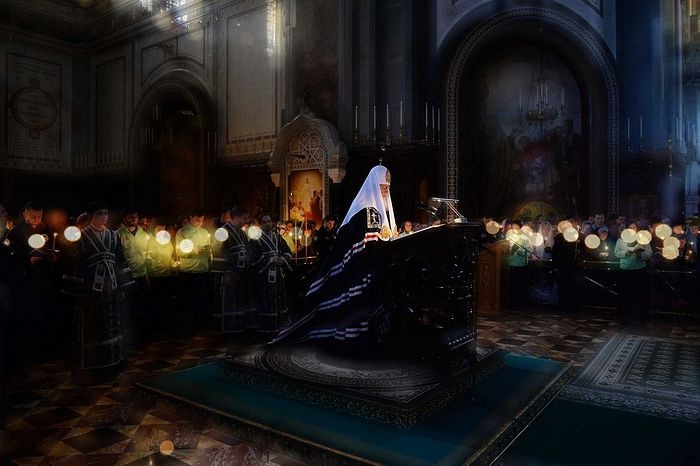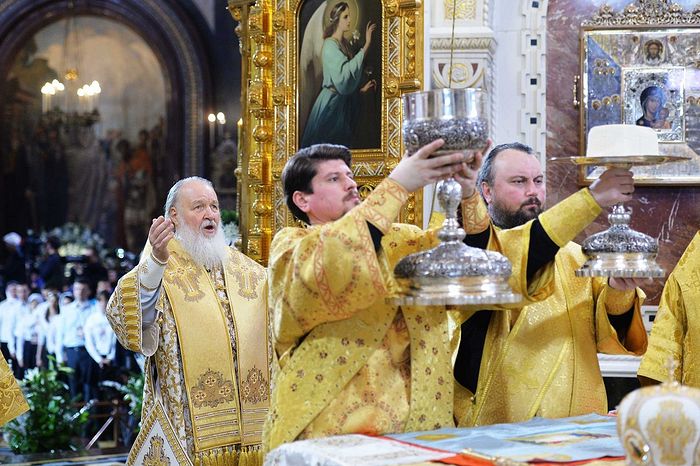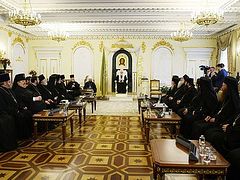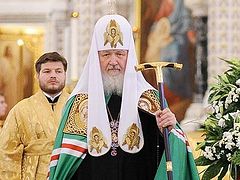Today, on the tenth anniversary of the enthronement of His Holiness Patriarch Kirill of Moscow and All Russia, we are publishing selected sayings of by the primate of the Russian Church.
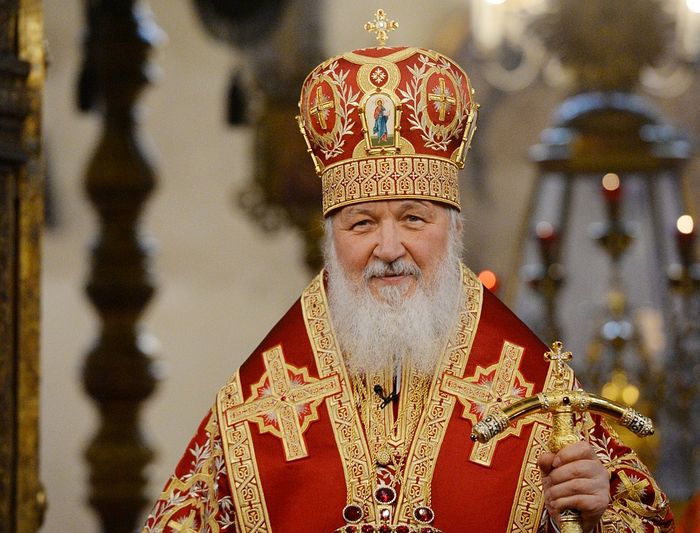 Moscow, 2017. Service on Bright Monday in the Dormition Cathedral of the Moscow Kremlin. Photo: Oleg Varov/Patriarchia.ru.
Moscow, 2017. Service on Bright Monday in the Dormition Cathedral of the Moscow Kremlin. Photo: Oleg Varov/Patriarchia.ru. ON THE CHURCH
Only Christ represents the Church
The Russian Orthodox Church does not represent Russia, just as it doesn’t represent other countries where it has a pastoral responsibility, among which are Belorussia, Ukraine, Moldavia, Japan, and China. The Church represents only Christ, it bears only the word of Truth, which it proclaims to people.
From an interview with Le Figaro
prior to a pastoral visit to the Korsun diocese, December 3, 2016.
The Church takes care for the one thing needful
As opposed to all other institutions, the Church of God takes care that the measure of love be great and that even death might not set the boundaries of love. That means that the Church takes care for the most important thing—human happiness.
From a sermon after the Liturgy in the Church of St. Sergius of Radonezh at
Khodenskoe Field, Moscow, October 22, 2017
Our word to the world should be filled with love
The salvation of the world is the first Coming of Christ. But the Lord does not deny the fact of final justice. If at the center of His first Coming was the service of salvation, then in the center of His Second Coming will be judgment over the human race. It is precisely in the light of the Second Coming that our Church, which lives within history, must bear witness to itself so that people would be saved, so that people would not perish, so that the Second Coming, the coming of the Judge, would not be an irreparable tragedy for many, many of them. Therefore, our word to the world should be filled with love—not arrogance, not excessive firmness, but authentic love—for we are called to save the world, so that God’s judgment over the world would find a majority of righteous and only a minority of sinners. Then the very essence of God, who is a God of love, will be made manifest to the world in all its fullness, visible and invisible.
From a sermon after the Liturgy in the Christ the Savior Cathedral,
Moscow, May 24, 2017, on the commemoration day of
Sts. Cyril and Methodius, teachers of the Slavs
Our Church is a school of mercy
It is very important that the Church be a school of mercy. It is very important that in calling their flock to compassion, the clergy would themselves perform acts of mercy. In order to test our spiritual state, during Great Lent each should ask himself: What good have I done? Whom have I really helped? To whom have I reached out my hand to help? With whom have I shared my material resources? Will I be justified at the Last Judgment? Because at the Last Judgment of God, we will be asked about deeds of mercy.
From a sermon after Great Vespers
at the Vysoko-Petrovsky Stavropegal Monastery, Moscow,
March 2, 2017, Thursday of the first week of Great Lent
 Patriarchal service on the day of the Repose of St. Sergius of Rodonezh. Divine Liturgy at the Holy Trinity-St. Sergius Lavra. Photo: Oleg Varov/Patriarchia.ru.
Patriarchal service on the day of the Repose of St. Sergius of Rodonezh. Divine Liturgy at the Holy Trinity-St. Sergius Lavra. Photo: Oleg Varov/Patriarchia.ru. On the Church and the world
The era in which we are living is very complex. The most dangerous thing that is happening today is the blurring of boundaries between good and evil. The devil has succeeded in suggesting to people that he doesn’t exist, and now he is managing to suggest that good and evil are relative concepts. So to say, everyone has his own good, his own truth, and it all depends on the circumstances—one and the same thing can be either good or evil. This whirlwind, this juggling of the most sacred understandings, which have a direct relationship to the salvation of the human soul, is the greatest temptation of our era.
But the Church is set as a guard; the Church is called to make known God’s truth. Often what the Church says is not understood in full measure by the world around us, and sometimes it is even rejected by it—precisely because the news that the Church brings to the world comes from God Himself. And if the devil wars against God, then it is quite natural that the word of the Church directed at the world is often distorted, misunderstood, and even subjected to mockery.
But with all the complexities of today’s life, a believing Christian cannot lose hope, because in the Word of God it is said: I will build my church; and the gates of hell shall not prevail against it (Matt. 16:18). This means that until the end of the world the Church will bear God’s truth, regardless of whether or not this truth is accepted.
Sermon on the eve of the feast of the Kazan icon of the Mother of God,
Optina Monastery, July 20, 2017.
ON THE EUCHARIST
 Patriarchal service at the Butovo firing range on the feast of the Synaxis of New Martyrs who suffered at Butovo. Photo: Sergei Vlasov/patriarchia.ru.
Patriarchal service at the Butovo firing range on the feast of the Synaxis of New Martyrs who suffered at Butovo. Photo: Sergei Vlasov/patriarchia.ru. We touch eternity
Every time we serve the Divine Eucharist, we touch eternity, we come out of the boundaries of physical existence. While remaining human, having a body and a soul, we touch the very Body and Blood of the Savior; we leave the boundaries of this world, even if we ourselves are not aware of it.
From a sermon after the Liturgy in the St. George Church on Poklonny Hill, Moscow, May 6, 2017,
the feast day of St. George the Greatmartyr and
the Iveron icon of the Mother of God.
In serving Divine Liturgy, in bring forth our sins and human ignorance as a sacrifice, we perform and act that is on one side physical, visible, and rooted in time and space, but on the other side is the greatest thanksgiving to God by the power of the Holy Spirit, beyond any time and space, which the Lord on the eve of His suffering willed to us to serve; and in participating in the Eucharist, we make contact with God’s Kingdom, with another world.
From a sermon after Divine Liturgy
in the Cathedral of the Vladimir Icon of the Mother of God,
on the commemoration day of Holy Hieromartyr Hilarion, Archbishop of Verea,
December 28, 2015
A straight path to God
But the Lord has placed it in our souls and in it we find the reflection of eternity. Our soul is the little window into eternity. When we perceive the world’s beauty with our hearts, the beauty of human creation, beautiful works of music or art, feeling that the law of harmony that was placed in human and cosmic existence bears its fruits—every time we encounter this harmony, this beauty established by God, we are actually looking through this window into eternity. But there is a more direct path—when man turns with faith to God, when he prays, when he participates in the Divine Mystery of the Eucharist, when the very Body and Blood of Christ touches our nature—at that moment we are peering into eternity.
From a sermon on the feast of the Transfiguration of the Lord,
after the Liturgy on the cathedral square
in front of the Transfiguration Cathedral,
Vyborg, August 18, 2017
ON THE PRIESTHOOD
The most important thing is the inner spiritual world
The most important thing is our inner spiritual world. The most important thing is the priest’s work on himself. It is very important [for a priest] to never become used to his pastoral service, never turn into a machine that stereotypically answers questions that are asked of him. And if the pastoral feeling is preserved strong and bright, if the priest’s conscience always remains in a state of exalted readiness to respond to the problems of others, then the result of that priest’s work with the faithful will be completely different.
From a report at the Eighth All-Church Conference
for social service, Moscow, October 19, 2018
The work of a priest is the work of love
Out of all the most noticeable works that witness the Lord is the work of love; for God Himself is love (cf. 1 Jn. 4:8). The readiness to listen to another person, the concern for his problems, sympathy for his needs, the ability to find words of consolation and encouragement—this is what people are looking for in the church, and especially in archpastors and pastors—by which the Church is usually judged.
A homily given at the consecration of Bishop Theophan (Danchenkovo)
of Volzhk and Sernursk, Moscow, November 18, 2017,
the day of St. Tikhon of Moscow and All Russia
ON MONASTICSM
Truly a step towards God
If having put on the monastic garments we do not dedicate ourselves wholly to the Lord, then we will be especially subjected to punishment and the particular judgment of God. That is why before receiving the tonsure we have to be aware that by receiving vows, a person enters into a special relationship with his Creator. He or she renounces the world and what is in the world, for the sake of love for the Lord.
But this renunciation should be real. This renunciation should be truly a step toward special communion with God. If this renunciation consists only in exchanging one set of clothing for another, and our life remains basically what it was before, imposing no hardships on us, then that special relationship to the Lord does not include such monks and nuns, who by their way of life reject the vows they made to Him.
<...>
And how important it is that every monastic might say something with all his heart to pilgrims, to support them in difficult circumstances, to pray for them and never, ever place himself higher than secular people who come to the monastery. For we do not know who will be first in line at God’s judgment, who the Lord will justify, and who He will punish.
From a sermon after the Liturgy at the Holy Trinity-St. Stephen of Makhrisch Monastery,
on the commemoration day of St. Varlaam, Bishop of Suzdal and Tarusk,
wonderworker of Makhrisch, September 3, 2018
ON PURITY OF FAITH
The Patriarch’s duty is to not allow strife to grow into into schism, disorder, and heresy.
The Patriarch is the preserver of the inner unity of the Church, and together with his brother bishops, the preserver of purity of faith. I accept as a special sign from God that this patriarchal enthronement is taking place on the commemoration day of St. Mark of Ephesus—the bold defender and fighter for the Orthodox faith. The Patriarch’s duty is to not allow the growth of disagreement, which according to the apostle, “must be” (cf. 1 Cor. 11:19)—schisms, disorder, and heresy.
Homily after his enthronement
Februray 1, 2009, in the Christ the Savior Cathedral
ON MODERNITY
The worst disaster of modern life is the lack of love
A Christian is a person who follows Christ, not only when it’s convenient or comfortable, but always. The true follower of Christ cannot but have pain in his heart not only for is close ones, but also for his city, his country, and for the whole world. The worst disaster of modernity is not economic and political crises, but the acute, now chronic, lack of love: for one another, for our Creator, and for all creation.
From a homily at the opening of the monument to Holy Equal-to-the-Apostles Prince Vladimir in Moscow, November 4, 2016.
Eternal values and the values of this world
St. John Chrysostom has the following remarkable words. He says that people who neglect eternal values become incapable of using the valuable things of this world. What is dear to people: money, prosperity, career growth—often all turn into dust, because if what is most foundational in life is trampled under foot, then all those secondary things often become deformed, so that no money, no power, and no high status or even glory can bring anything to a person.
From a homily after the Liturgy in the St. Nicholas Cathedral
at the Khotykovo Protection Convent, September 10, 2017
ON FAMILY RELATIONSHIPS
The family is the point of entry into the Kingdom of God
Just as in the Church through unity with God in the sacraments human loneliness and limitedness is overcome, and the soul is warmed and fed with the grace of the Holy Spirit, so in the family, amidst relatives and friends, a person acquires peace and wellbeing, strength and inspiration to labor. The family in which peace and love reigns is a kind of entrance into the Kingdom of God; it is a domestic Church, as Holy Scripture calls it.
From a television appearance,
January 7, 2017, the feast of the Nativity of Christ
Parents, be vigilant!
Parents bear responsibility for their children, and therefore they must be vigilant. Think not only about your own ground, but the ground of your children’s souls. What influence does their environment have on them? Try through kind words, through your own example, and through prayer to ensure that your child’s soul does not turn into stone, because that stony soul will reject not only God’s word, but also love, and faithfulness; and it will not perceive the true joys of life.
From a sermon after the Liturgy in the Christ the Savior Cathedral, Kaliningrad, September 1, 2017, the feast of the Donskoy Icon of the Mother of God.
ON LOVE
The main thing is to love Christ
It is impossible to fulfill the commandments formally, just as a child cannot formally obey his parents if he does not love them, if they are alien to him. Neither can a person formally fulfill the commandments—read the text and then say: “I will fulfill them.” Nothing will come of it, and St. Gregory the Theologian speaks wonderfully about this. In his words, the main and correct path to the knowledge of God is love for God in the heart, which is preferable to the path of the mind. The path of the mind is also necessary, but it will never unite a person with God if that person does not feel God with his heart; if he does not feel love for Him.
But loving the invisible is nearly impossible. Therefore the Lord sent His Son, the Savior of the world, our Lord Jesus Christ, so that we would not only hear His words, but also come to love Him, having read the Gospels, and looked at His image; so that He would become the image, ideal, light, and hope of our lives. Then through love for God the possibility will open to us to fulfill His commandments; and as soon as we begin to fulfill them we will enter into the orbit of divine life. And then not only with our minds but also with our hearts and feelings, with our whole lives we will touch God, and feel His power and grace.
From a homily after the rite of the great blessing and Liturgy in the
Resurrection Cathedral, Bishkek (Kirgizia), May 28, 2017, the seventh week after Pascha, the Holy Fathers of the First Ecumenical Council
On love of enemies
Try to love the one who has stood in your way and hinders you. But the Lord says: “Love your enemies”. <...> If we make plans to fight against those we consider to be our enemies, if we make ourselves empty for the sake of this struggle, he has already conquered us. We were abiding in a peaceful state of soul, but suddenly an enemy has appeared, and our peaceful spirit is gone, nothing enters our head but thoughts about that enemy. He didn’t even do anything but we are already worrying, struggling with him in our thoughts, maybe even reciting in our minds what we’ll say to him we meet him. Without doing anything our enemy has already occupied our inner peace.
As soon as we see an enemy in someone, we are deprived of our inner peace and wellbeing, and that means that enemy has already conquered us. Therefore, when the Lord says, “Love your enemies”, He invites us to preserve a peaceful spirit, so that enmity would not take over our consciousness, our will, our feelings, and not darken our spiritual gaze. The wise words of the Gospel, “Love you enemies” should be understood in such a way that no enemy should ever destroy our inner peace. And so that this would be so, we have to learn to give over those we consider to be our enemies into the hands of God. That is what saints and wise people always did, who in answer to offenses replied: “God is your judge, and not I. I do not want to enter into conflict with you; those terrible, evil thoughts that you threaten me with are alien to me, and may God judge you.” In these words is the fulfillment of the commandments of love of enemies. We do not bare our weapons, but give them over into the hands of God.
From a sermon on the feast of the Protection, after the Liturgy
in the Church of All Saints in Minsk, October 14, 2018
ON REPENTANCE
Repentance returns God to our lives
Repentance is an appeal to God. There can be no appeal without repentance, and without an appeal there can be no return of God to our lives. By renouncing our own “I,” we restore that order of life that God was pleased to establish in the creation of the world and man. In repentance we as if recreate God’s plan for the world and man.
Without repentance, there is no religious life, and no wise religious philosophy, no beautiful words can change anything in the life of a man if he does not have the experience of repentance.
Homily after the Matins service on Clean Monday, March 2, 2009
ON NOT JUDGING
Let us not condemn
There is a sin that we don’t always consider a sin—it is called condemnation. We constantly condemn—co-workers, family members, friends, and neighbors. Sometimes we subject people to just criticism for their wrongdoings, but more often than not, condemnation has no rational assessment or deep analysis. As a rule, we project our own negativity, our own difficult situation onto others. We want to be surely better than he is. Every condemnation includes our exaltation over the one we are condemning…
If in Great Lent we, by the grace of God, free ourselves at least from one sin—if we do not condemn people, if we betray them into the hands of God, into the hands of Divine truth—then we will really achieve something during these holy forty days. Even if we are offended, upset, irritated, let us say: “I’m not angry with you; it’s none of my business. God is your judge,” and never say that this person is worse than me. We don’t have to set any grandiose tasks for ourselves—to defeat every sin, to become completely different—so as not to be disappointed, because it’s impossible to achieve everything in forty days. But if at the end of Lent we feel that we have dealt with one sin—the sin of condemnation—that we will no longer allow ourselves publicly or privately to condemn someone, bearing in mind that without forgiving others, we ourselves fall under Divine non-forgiveness—then we will do much on the path to God.
Homily on Clean Monday, March 14, 2016
The worst thing is when we judge what is hidden from us
The worst thing is when we bring our human judgment upon that which is hidden from us. It seems outrageous to us that a criminal or an atheist or any unworthy person should suddenly commune of the Holy Mysteries of Christ and even confessed. Do such things really happen accidentally? Maybe it’s a confession on the threshold of death and this Unction was the crown of his life? Maybe he was moving towards this event his entire life and the Lord granted him to taste this grace on the threshold of death. But a holy man, who constantly communed and confessed, was taken to the Lord under different circumstances, without confession and Communion, because he was worthy to cross the line separating this life from that life, without confession and Communion.
From the television program The Pastor’s Word, December 3, 2016
ON HUMILITY
 Visit to the Golgotha-Crucifixion and Holy Trinity Sketes on Solovki, August 21, 2017. Photo: Oleg Varov/patriarchia.ru
Visit to the Golgotha-Crucifixion and Holy Trinity Sketes on Solovki, August 21, 2017. Photo: Oleg Varov/patriarchia.ru On the wisdom of humility
A humble man is a man for whom God is the center of his life, and who places his deeds under the judgment of God, meaning under the judgment of his conscience.
A humble man is he who places himself under the judgment of God.
Homily after Great Compline on Clean Wednesday, March 9, 2011
We confuse humility with weakness
If God is inherently humble by nature, then we, earthly people, confuse humility with weakness, basing our relationship with others by no means on humility, but on the desire to demonstrate our capabilities, our physical strength, or even our intellectual power to defeat those who stand in our way.
The Holy Fathers testify that without humility there can be no patience. Without humility there can be no generosity. Without humility there can be no meekness. Without humility, the heart of man cannot make room for love. In the prayer of St. Ephraim the Syrian, which we repeat throughout Great Lent, these virtues are bound together. It is fair to say that humility, full of great wisdom, is an indispensable condition for the development of the virtues within us.
Homily after the Liturgy in the Christ the Savior Cathedral
on Palm Sunday, April 9, 2017
Humility is the great strength of man
Humility is not weakness, but the great strength of man. It is the absence of malice in the soul; it is the inability to answer evil with evil; it is the lack of desire to assert your rightness with the help of evil. Humility is kindness in human relationships. When people don’t understand such kindness, it can seem to them that it’s weakness; but in fact, kindness is a great strength, because God is the absolute Good and absolute Power. And when we do good deeds, we touch the Divine life and also become strong.
Homily after services in the Conception Stravropegal Convent
on Clean Monday, February 27, 2017
How to become prudent
The Holy Fathers offer us the path to overcome all the problems associated with acquiring the gift of prudence, and St. John Cassian the Roman says that the most reliable means of acquiring prudence is humility. In fact, excessive insistence is often underpinned by human pride. A man decides something and, under the authority of pride, he does everything to make sure it goes the way he planned. Such a man very often clashes with others, and his life becomes unbearable. It is said of such people that they have a bad character; but the matter is not in character, but in the internal spiritual condition. If a man places himself at the center of his own life, then, naturally, what happens around him that doesn’t correspond with his plans causes irritation and a painful reaction.
Homily after services at Donskoy Monastery,
on Clean Thursday, March 17, 2016
ON PATIENCE
 Visiting a pediatric hematology center in Moscow, September 2, 2012. Photo: Kirill Novotarsky/patriarchia.ru
Visiting a pediatric hematology center in Moscow, September 2, 2012. Photo: Kirill Novotarsky/patriarchia.ru On the virtue of patience
Patience is the ability to react to the evil that affects us without losing the presence of the spirit, without dissipating your internal energy, not falling into murmuring, into anger, into malice, or the desire for revenge.
Undoubtedly, the will is present in our attempts to acquire patience, but the patient man does not absolutely have to be strong-willed, because patience is a state of the spirit. Any strong-willed man at some point will not be able to endure unrighteousness, insults, or offenses. He lacks the will and his patience runs out because he had no patience, only strong will and a good upbringing.
Hope in God, a living sense of faith, and the understanding that God will protect us and restore justice create inner peace in man. Patience, like armor, guards the inner state of our souls from every external evil and sinful circumstance, and patience becomes a step on the path to the Kingdom of God.
Homily after Matins on Clean Thursday, March 10, 2011
ON THANKSGIVING
Thanksgiving is an essential characteristic of a man’s religious life. We can all measure the level of our religiosity on this basis. Ask yourself, what portion of your prayers involve thanksgiving to God and you will immediately determine the level of your religiosity, the level of your faith. A man of ardent faith first of all thanks God ceaselessly for every day of his life, that he sees and hears, for the ability to work, for his family and friends, for those who go through life together with him. He thanks God for peace on earth; He thanks God for fresh air and pure water, for what he has, that he can taste, that he can keep up his strength. The believer first of all thanks God, and in light of this thanksgiving asks the Lord’s blessing and help in his life and in his affairs.
Homily, December 23, 2018
ON GOOD WORKS
 Meeting with the staff and students of the Orthodox Mercy service. Photo: Sergei Vlasov/patriarchia.ru
Meeting with the staff and students of the Orthodox Mercy service. Photo: Sergei Vlasov/patriarchia.ru Good deeds are oxygen for faith
Faith without works is dead (Jas. 2:26). If we do not travel in good works, then our faith will ebb, for good works are like oxygen, necessary for the flame to burn; and when there is no oxygen, the flame fades, no matter how much fuel there is. In the same way, the life of a Christian fades, regardless of rank, of position in the Church, of education, of everything with which a man fills his intellect and life, if there are no good works.
Homily, after the Liturgy at the Sts. Martha and Mary Convent,
Moscow, October 11, 2018
ON SALVATION
Salvation is possible only by the power of God
Man is not saved by his own righteousness, his own works, but only by God’s mercy (cf. Tit. 3:4-7)—by mercy, which comes to us through the action of the Holy Spirit, through the grace of God, coming from Himself and touching us, our human nature, our world, created by God, but darkened by sin. Even with the most powerful, the strongest, the richest man is powerless to defeat sin. Moreover, the stronger, the richer the man, the more temptations he has, and the fewer the opportunities to save his souls, to be delivered from sin, from demonic captivity. Man is not given such power—it can be done only by the power of God, manifested to us through the descent of Divine grace upon every believer, every member of the Church.
Homily after the Liturgy on the feast of Theophany,
in the Theophany Cathedral, Moscow, January 19, 2019
Faith is the key to salvation
No human merits can save us; we can enter into the space of salvation only if we have the key to the door—and this key is our faith. Faith does not save, but is a condition for our salvation. Without it, everything that the Lord did for us and for our salvation will not be applied to us. That is why today the sermon on faith, the call to believe in the Lord and Savior to those who do not believe, the call to preserve faith to those who are beginning to waver, is the most important message that the Church addresses to the world. Again and again we say that salvation is from God, but we can obtain this salvation through faith and through accepting the Divine grace that is given to men in the Church.
Homily after the Liturgy at the Exaltation of the Cross Jerusalem Convent,
on Thomas Sunday, April 15, 2018
The cross of Christ is the symbol of our salvation
The greatest of wisdom lies in this symbol of salvation—in the cross of Christ. We must try to accept the crosses placed upon us from above with faith in the Lord—never murmuring in any situation, never tossing up our hands, never giving up in the face of difficult circumstances, but recalling the cross of Christ, go through life knowing that the cross will eventually be removed from you. Crosses are removed in response to our efforts, our faith, our trust in God.
Homily, after the Liturgy in the Dormition Cathedral,
Tashkent, October 1, 2017







